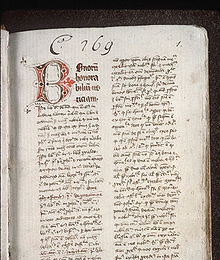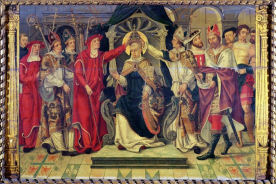 |
| Expositio & questiones manuscript |
For example, Aristotle believed that an object set in motion—let's say, a rock thrown by a human hand—continues to move after it has left the hand because there must be some continuous external force exerted on it. He theorized that, in the same way a hand swished through water creates little eddies and swirls in the water around it, so the rock's movement is continued by eddies and currents of the air. If there were no movement in the medium that helped carry the rock forward, he believed, the rock would stop its forward course (and presumable drop the the ground). The currents eventually faded, allowing the rock to end its forward flight.
Buridan was not satisfied with this. Building on the work of others (such as John Philoponus and Avicenna, both of whom deserve their own entries some day), he believed that there must be a property in the rock itself that accounts for its action once it has left the motive force of the hand. He called this property of the object impetus (from Latin impetere, literally "to rush toward, to attack").
The property or quality of impetus was clearly changeable. To hurl a heavy rock required you to give it more impetus than to hurl a pebble. Also, impetus was obviously used up over time, allowing the rock to cease its movement and fall. He also explained that a falling object gained impetus the longer it fell (are you paying attention, Galileo?). Unlike Aristotle, who believed that the medium of air in which the object moves helps it along, Buridan saw the air as resistance, causing the object to use up its impetus.
He expanded this theory by looking up. A question had bothered some philosophers for ages: why don't the planets slow down? Will they move forever? Buridan extrapolated his theory to say that a thrown rock in a vacuum would experience no resistance and its impetus would last indefinitely. If the planets were moving in a vacuum...
Well, actually, he couldn't go that far. He agreed with Aristotle that a vacuum couldn't exist in space, since there was no container to keep matter from rushing into the empty area. If above our atmosphere were filled with quintessence, however, Aristotle's "fifth element" that was pure, unchangeable, and frictionless, then the impetus imparted to the planets by whatever initial agency would continue to move forever! The idea of an eternal universe was supportable by science!
















